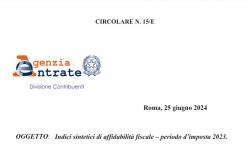The reading of thearticle 20 of Legislative Decree no. 13/2024which introduced the biennial preventive agreement, in its literal expression is clear and direct:
“The advance payment of income taxes and the regional tax on productive activities relating to the tax periods covered by the agreement is calculated on the basis of the agreed income and value of net production…”
The text continues by establishing what we have already assimilated as a fulfillment, that is, in this first year of application, allowing time until October 15th for possible membership for those who would have had to pay the deposit in two installments:
“…the second installment is calculated as the difference between the total advance payment due based on the agreed income and value of net production and the amount paid with the first installment calculated according to the ordinary rules.”
By November we will have to quantify the exact amount due based on the rule set out above. It would therefore seem that the reflections deriving from the possibles cannot be considered costs borne by the taxpayerthink of the more ordinary ones such as:
- medical expenses;
- interest expenses;
- restructuring costs.
With particular regard to the audience of VAT numbers, potential users of the institution of the biennial composition with creditors, also the social security contribution cannot affect the determination of the amount due.
By doing so, these significant amounts cannot be considered for the purposes of calculating the advance payment. An anticipation of thedisbursement during 2024with the concrete possibility of closing the fiscal year with a credit due to the various variables affecting the quantum due, which by applying the text of the law in a literal sense it is not possible to consider it for the purposes of determination of the advance payment.
But is it really like that? In my opinion “no”for the following reasons.
Biennial composition with creditors: the origins of the advance payment
The text of the Law of 03/23/1977 n. 97 – “Provisions regarding the collection of income taxes”which introduced into our tax system thetax advance obligationprovides in its Article 1 that:
“Starting from the year 1977, taxpayers subject to Irpef or Irpeg must pay in the month of November of each year, as an advance on the tax due for the current tax period, an amount equal to 75 per cent percent of the tax relating to the previous period, as indicated, net of deductions and tax credits and withholdings, in the tax return presented for the same period.”
Article 2 indicates the sanctioning regime applicable and possible consequences:
“In case of omitted or delayed payment of the advance payment required by art. 1 of this law or of the difference referred to in the first paragraph of this article or of payment made insufficiently, the provisions of the articles apply. 9 and 92 of the Presidential Decree of 29 September 1973, n. 602, and subsequent amendments.
The provisions of the previous paragraph do not apply:
- whenever it is failed to pay the deposit, if the tax due on the basis of the declaration referred to in the first paragraph of this article, net of tax deductions and credits and withholdings, is an amount not exceeding one hundred thousand lire for taxpayers subject to Irpef and to forty thousand lire for taxpayers subject to Irpeg;
- when thedeposit paid is less than that due pursuant to art. 1, but not less than 75 percent of the tax due based on the declaration referred to in the first paragraph of this article, net of tax deductions and credits and withholding taxes.”
Biennial composition with creditors: the rules on the advance payment
the substance is enough that the deposit paid “cover” the current percentage of 98 percent of what is due for the current year for not see sanctions applied referred to in Presidential Decree 602 and, consequently, there is no need to resort to active repentance.
It is interesting to read the Circular dated 31/10/1977 n. 96 of the Ministry of Finance “Provisions regarding the advance payment of personal income tax and corporate income tax.” I limit myself to pointing out a few passages.
A curiosity is contained in part n. 1, which motivates theintroduction of the deposit in our system:
“With the aforementioned provision, an attempt was made to achieve the desired rapprochement between the moment of receipt of income and that of collection of the tax, in order to mitigate, as far as possible, the inequality of treatment existing between taxpayers subject to taxation through withholding at the source, and therefore at the very moment of production of the income, and taxpayers whose taxes are, however, paid in times subsequent to the annual reference period.”
I also point out the concrete examples of application of the rule introduced at the time, contained in part no. 5 of the circular. One of these, theexample Bexplains that the penalty for those who have paid advance payments that are lower than due is calculated on the basis of the reference to the previous year but commensurate with what is due for the current year.
It is also necessary to underline another step:
“The condition of punishment for failure to pay the advance payment must be verified in relation to the existence or otherwise of the payment obligation with regard to the tax debt relating to the declaration of the previous year and that of the current year.”
This is the reading of the then Ministry of Finance on which the so-called “forecasting method”the application of which has not been expressly stated excluded from Legislative Decree 13/2024.
It’s true that some “rumors” that are circulating among professionals hypothesize the introduction, shortly, of some adjustments to the structure of the biennial composition with creditors, which will not have a particular impact on the rules but which should also concern the down payment calculation method for the year 2024.
All that remains is to wait for its developments. Meanwhile, it is also appropriate to focus on the evaluation ofimpact of the charges for the current year on the quantification of the advance payment.





